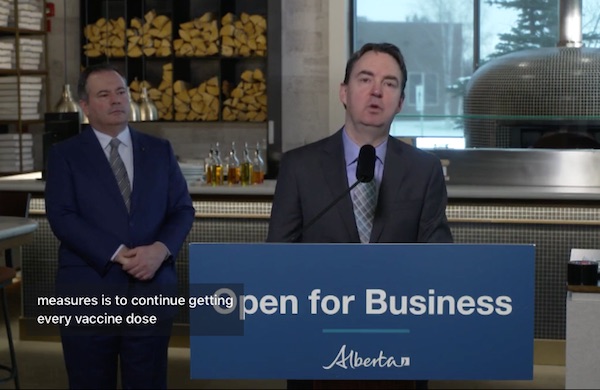Alberta
Alberta drops almost all public health restrictions – Municipalities will have to follow suit

Alberta is a leader in lifting the majority of public health measures, as the province moves to step two of reopening.
Albertans are now able to enjoy social gatherings without limits again and visit businesses without capacity restrictions. Children and youth are free to resume regular school life and enjoy activities without mandatory prior screening.
The provincial mandatory mask mandate has also ended, except in AHS facilities, continuing care and on public transit in order to protect vulnerable Albertans.
Mandatory isolation for COVID-19 core symptoms or a positive test result remains in place. Isolation periods are five days at home and five days of continued masking for fully vaccinated individuals, or 10 days for partially and unvaccinated individuals.
Step two
Now in effect:
- Remaining provincial school requirements (including cohorting) are removed.
- Screening prior to youth activities is no longer required.
- Capacity limits are lifted for all venues.
- Limits on social gatherings are removed.
- The provincial mask mandate is lifted in most settings. However, masking will still be required in the following high-risk settings: on public transit, at Alberta Health Services-operated and contracted facilities and all continuing care settings.
- Municipal bylaws may continue to be in effect.
- Albertans may wish to consider individual risk factors and choose to wear masks in other public indoor settings.
- Restrictions on interactive activities, liquor service and operating hours are lifted.
- Mandatory work-from-home requirement is removed.
Step three
To be determined based on hospitalization rates continuing to trend downwards.
- COVID-19-specific measures in continuing care and AHS facilities and on public transit will be removed.
- Mandatory isolation becomes a recommendation only.
Additional details on all restrictions and measures in place are available at alberta.ca.
“I am proud of our province and its people on reaching this milestone. The majority of Albertans came together to keep everyone safe, and this is the result we were working towards. The pressure on our health-care system and the people it serves is lessening and we can now move forward. As we safely get our lives back to normal, we can move forward toward Alberta’s great economic recovery.”
“Thanks to the vaccination uptake in the province and the commitment of millions of Albertans these past two years, we are closing in on normal life. As we shift to an endemic response, I am confident that we can take the lessons we have learned through this pandemic to build an even more robust health-care system for our province’s future.”
Alberta
Owner sells gas for 80 cents per litre to show Albertans how low prices ‘could’ be

Undoubtedly some of the motorists driving past The Whistle Stop Cafe at Mirror on Tuesday morning thought it was an April Fools prank. It wasn’t.
Chris Scott, owner of the gas station at The Whistle Stop Cafe offered a one day promotion on April 1st. Scott sold 8000 litres of regular gasoline for $0.80/ litre.
The promotion was funded by Scott and the Alberta Prosperity Project. In this video posted to his social media, Chris Scott explains why they did it.
Alberta
The beauty of economic corridors: Inside Alberta’s work to link products with new markets

From the Canadian Energy Centre
Q&A with Devin Dreeshen, Minister of Transport and Economic Corridors
CEC: How have recent developments impacted Alberta’s ability to expand trade routes and access new markets for energy and natural resources?
Dreeshen: With the U.S. trade dispute going on right now, it’s great to see that other provinces and the federal government are taking an interest in our east, west and northern trade routes, something that we in Alberta have been advocating for a long time.
We signed agreements with Saskatchewan and Manitoba to have an economic corridor to stretch across the prairies, as well as a recent agreement with the Northwest Territories to go north. With the leadership of Premier Danielle Smith, she’s been working on a BC, prairie and three northern territories economic corridor agreement with pretty much the entire western and northern block of Canada.
There has been a tremendous amount of work trying to get Alberta products to market and to make sure we can build big projects in Canada again.
CEC: Which infrastructure projects, whether pipeline, rail or port expansions, do you see as the most viable for improving Alberta’s global market access?
Dreeshen: We look at everything. Obviously, pipelines are the safest way to transport oil and gas, but also rail is part of the mix of getting over four million barrels per day to markets around the world.
The beauty of economic corridors is that it’s a swath of land that can have any type of utility in it, whether it be a roadway, railway, pipeline or a utility line. When you have all the environmental permits that are approved in a timely manner, and you have that designated swath of land, it politically de-risks any type of project.
CEC: A key focus of your ministry has been expanding trade corridors, including an agreement with Saskatchewan and Manitoba to explore access to Hudson’s Bay. Is there any interest from industry in developing this corridor further?
Dreeshen: There’s been lots of talk [about] Hudson Bay, a trade corridor with rail and port access. We’ve seen some improvements to go to Churchill, but also an interest in the Nelson River.
We’re starting to see more confidence in the private sector and industry wanting to build these projects. It’s great that governments can get together and work on a common goal to build things here in Canada.
CEC: What is your vision for Alberta’s future as a leader in global trade, and how do economic corridors fit into that strategy?
Dreeshen: Premier Smith has talked about C-69 being repealed by the federal government [and] the reversal of the West Coast tanker ban, which targets Alberta energy going west out of the Pacific.
There’s a lot of work that needs to be done on the federal side. Alberta has been doing a lot of the heavy lifting when it comes to economic corridors.
We’ve asked the federal government if they could develop an economic corridor agency. We want to make sure that the federal government can come to the table, work with provinces [and] work with First Nations across this country to make sure that we can see these projects being built again here in Canada.
-

 2025 Federal Election2 days ago
2025 Federal Election2 days agoChina Election Interference – Parties Received Security Briefing Days Ago as SITE Monitors Threats to Conservative Candidate Joe Tay
-

 2025 Federal Election2 days ago
2025 Federal Election2 days agoFixing Canada’s immigration system should be next government’s top priority
-

 2025 Federal Election1 day ago
2025 Federal Election1 day agoPoilievre, Conservatives receive election endorsement from large Canadian trade union
-

 Bruce Dowbiggin2 days ago
Bruce Dowbiggin2 days agoAre the Jays Signing Or Declining? Only Vladdy & Bo Know For Sure
-

 2025 Federal Election2 days ago
2025 Federal Election2 days agoLondon-Based Human Rights Group Urges RCMP to Investigate Liberal MP for Possible Counselling of Kidnapping
-

 2025 Federal Election2 days ago
2025 Federal Election2 days agoRCMP Confirms It Is ‘Looking Into’ Alleged Foreign Threat Following Liberal Candidate Paul Chiang Comments
-

 Business1 day ago
Business1 day agoBiden’s Greenhouse Gas ‘Greendoggle’ Slush Fund Is Unraveling
-

 Censorship Industrial Complex2 days ago
Censorship Industrial Complex2 days agoFrance condemned for barring populist leader Marine Le Pen from 2027 election





